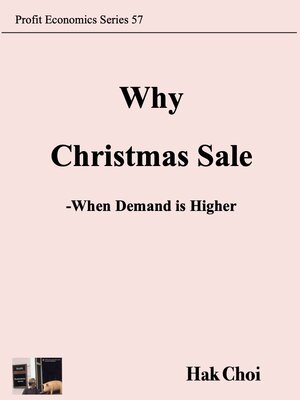Why Christmas Sale -When Demand is Higher
ebook ∣ Profit Economics Series, Book 57 · Profit Economics Series
By Hak Choi

Sign up to save your library
With an OverDrive account, you can save your favorite libraries for at-a-glance information about availability. Find out more about OverDrive accounts.
Find this title in Libby, the library reading app by OverDrive.



Search for a digital library with this title
Title found at these libraries:
| Library Name | Distance |
|---|---|
| Loading... |
Employees usually receive bonus before Christmas. To capture their extra money, many shops offer attractive discount. But why? Shouldn't the equilibrium price be also higher, when demand is higher? Some economists, e.g., Edward P. Lazear, used a demand function as explanation, which, however, is invalid for two reasons. First, it is not general enough. Secondly, although monopolists would appreciate the knowledge of the demand function for their goods, they aim for its higher price. Instead of explaining, some other economists simply denied duopolists from waging price war. This book applies Hotelling's (1929) duopoly competition theory to explain Christmas Sales, and price war in general, and finds the result not necessarily dismal. It also invokes a natural property, to make Christmas Sales a real game, i.e., one without any equilibrium. As a supplement, this book uses time to explain clearance sales.







